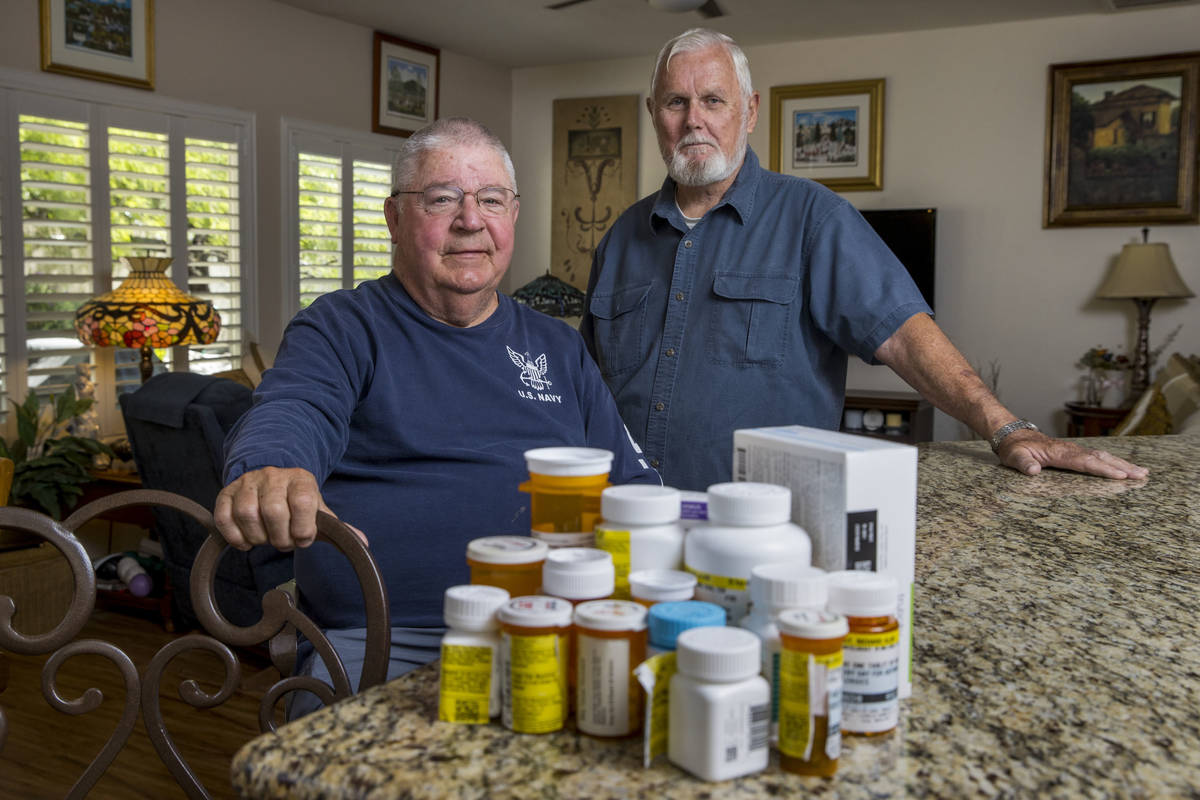Rx for anger: Nellis lockdown bars military retirees from pharmacy

When retired Navy Chief Petty Officer Richard Gray and his wife, Sheila, were able to go to the Nellis Air Force Base pharmacy, they picked up their prescriptions with full coverage and no copayment.
But now their only option is off base, and the 16 medications they take between them cost upward of $2,000 a month out of pocket at Walgreens.
Under the base’s public health emergency called on April 3 and renewed May 4 in response to the coronavirus outbreak, only uniformed members and their dependents and essential civilian contract employees are allowed on base, including the pharmacy.
The Nellis pharmacy was placed off-limits for retirees on April 10, leaving thousands of local military widows and retirees, many of them living on fixed incomes, locked out of the no-cost medication to which they are entitled. Now they are subject to copays that can quickly add up to hundreds of dollars.
“It’s coldhearted. You’re sending all these retired veterans out to sea because we’re a threat to the base mission?” Sheila Gray said. “Why are they designating this one group, who fought for their right to be there?”
Retirees do have other options: They can refill their prescription via Home Delivery by calling ExpressScripts, which requires the doctor to submit the prescription electronically, or a retail pharmacy can call the Nellis Refill Pharmacy to request a transfer of prescriptions.
But those options come with out-of-pocket costs.
$800 a month for prescription
For those with few prescriptions, the added expense can be minimal. But for others like Richard Gray, 72, who served 22 years and was medically discharged, his asthma medication alone costs around $800 a month.
Gray, who is also a diabetic and has battled prostate cancer since 2009, said he feels like he is being treated like a “second-class citizen.”
Some retirees say they understand the seriousness of the virus, but the base pharmacy is a drive-thru operation, and they don’t understand why Nellis hasn’t followed the lead of many other bases that have made adaptations to allow retirees to get their medications.
Nellis officials say they examined a variety of solutions, and “ultimately, limiting base access to uniformed members and their dependents and essential civilian and contract employees was the prudent decision to protect our retiree population, our personnel and their families, while still ensuring the success of our critical missions.”
“We understand these temporary base access restrictions are frustrating, but they are necessary to protect our entire Nellis population while continuing to conduct our critical missions. Satellite pharmacy services will be available on weekends in Phase IV of our phased reopening plan, details for which are expected to be released in the coming weeks,” officials said in a statement.
Retired Air Force Senior Master Sgt. David Pacheco said he understood that it would take “a couple weeks to formulate a plan and get organized” but didn’t expect the closure to last this long.
“I went to Vietnam four times,” he said. “I spent a whole year in Korea. I missed numerous occasions, birthdays, school events, Christmas, to earn the benefit that I was promised. And now for it to be taken away, I don’t think it’s fair.”
The closure of the base came after officials announced on March 19 that a service member from NATO who was at the base tested positive for COVID-19.
At least 51 COVID-19 cases on base
It was the first confirmed case at Nellis, and the man, who visited the base for Red Flag exercises, entered isolation when symptoms arose, officials said at the time.
Nellis officials have declined to report the total number of COVID-19 cases on base. But in an email obtained by the Review-Journal and dated April 23, Col. Cavan Craddock, commander of the 99th Air Base Wing, told personnel that 1,083 tests had been administered at the Nellis hospital and that 51 came back positive.
The base is in Phase Two of its reopening plan and will only move into each new phase after specific criteria — including no significant change in positive COVID-19 cases, robust testing capability, hospital surge capacity and extensive tracing measures — have been met and sustained for at least two to three weeks.
Phase Three will entail the return of all base personnel, but telework will be permitted where applicable, officials said.
Phase Four will see the elimination of the public health emergency and the reinstatement of base access for all eligible patrons, including retirees, on weekends only. Face masks and social distancing will remain in place and be required at the exchange, commissary and satellite pharmacy.
Phase Five will include full access to the base for all eligible persons. Social distancing requirements will be reduced until they are no longer necessary.
Retired Navy Lt. Cmdr. Kenneth Knudson, 82, said his 18 medications are up for a refill June 1, and he was surprised to learn when he was turned away that the base was closed to retirees.
“It kind of amazed me; I almost couldn’t believe it,” he said, adding that the base was a big factor in his decision to move to Las Vegas. “We do need this to go back. We need some answers. Our country’s turned their back on us right now.”
Korean War veteran and retired Navy Capt. Bill Dennison, 86, called closing the base to retirees “a sin, as far as I’m concerned.”
“We made sure that the people ahead of us would get what they were promised. Why should we have to pay for anything? The agreement was that we wouldn’t have to,” he said. ”There’s just no justification for that in my eyes. I guess I just wasn’t as important as I thought I was.”
Contact Briana Erickson at berickson@reviewjournal.com or 702-387-5244. Follow @ByBrianaE on Twitter.